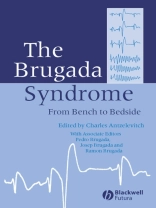Until recently, the cellular basis for sudden death, the Brugada
Syndrome, has largely remained an unknown to modern
arrhythmologists and cardiologists, particularly in the absence of
any structural heart disease. Detailed observations of age-groups,
especially the young, families and populations where sudden death
frequently occurs, and improved understanding of its contributory
factors and mechanisms are, however, showing the way forward.
This addition to the Clinical Approaches to Tachyarrhythmias
(CATA) Series, written by the investigators who discovered and
probed the Brugada Syndrome, discusses the history, etiology,
pathology and clinical manifestations of sudden death. From
diagnosis, prognosis, to therapeutic approaches using the latest in
cathater ablation techniques, electrophysiological surgery, and
genetic appraisal, the work is a testimony to the author’s
investigation. Using clinical cases in Thailand and Laos, they
further unravel the syndrome’s molecular mechanisms, studying
related syndromes, such as the long-QT syndrome, infant death, and
arryhthmogenic right ventricular cardiomyopathy.
By being informed of the electrophysiological abnormalities that
contribute to familial and genetic diseases, physicians,
cardiologists and all those who care for patients with cardiac
arrhythmias will be better able to identify and treat patients in
whom the Brugada Syndrome may strike next.
Inhaltsverzeichnis
Contributors.
Preface.
Dedication.
1 Brugada Syndrome: Overview.
2 History of the Brugada Syndrome.
3 Biophysical Analysis of Mutant Sodium Channels in Brugada
Syndrome.
4 Molecular Genetics of the Brugada Syndrome.
5 Cellular Mechanisms Underlying the Brugada Syndrome.
6 Brugada Syndrome: Diagnostic Criteria.
7 Value of 12 Lead ECG and Derived Methodologies in the
Diagnosis of Brugada Disease.
8 Brugada Syndrome: Relationship to Other Arrhythmogenic
Syndromes.
9 ST Segment Elevation and Sudden Death in the Athlete.
10 Brugada Syndrome Genetics. Genetic Screening- Role in
Diagnosis.
11 Genotype-Phenotype Relationship in Brugada Syndrome.
12 Gender Differences in Brugada Syndrome.
13 Predisposing Factors.
14 Acquired Forms of Brugada Syndrome.
15 Brugada Syndrome and supraventricular tacharrhythmias.
16 Prognosis in Individuals with the Brugada Syndrome.
17 Treatment of the Brugada Syndrome with the Implantable
Cardioverter Defibrillator.
18 Pharmacologic Approach to Therapy of the Brugada Syndrome:
Quinidine as an Alterative to ICD Therapy?.
19 Potential for Ablation Therapy in Patients with the Brugada
Syndrome.
Index
Über den Autor
Charles Antzelevitch, Ph D, is Executive Director/Director of
Research; Gordon K. Moe Scholar; Professor of Pharmacology at the
Masonic Medical Research Laboratory; Utica, New York.
Pedro Brugada, MD, Ph D, is Professor of Cardiology at the
Cardiovascular Center OLV Hospital in Aalst, Belgium.












